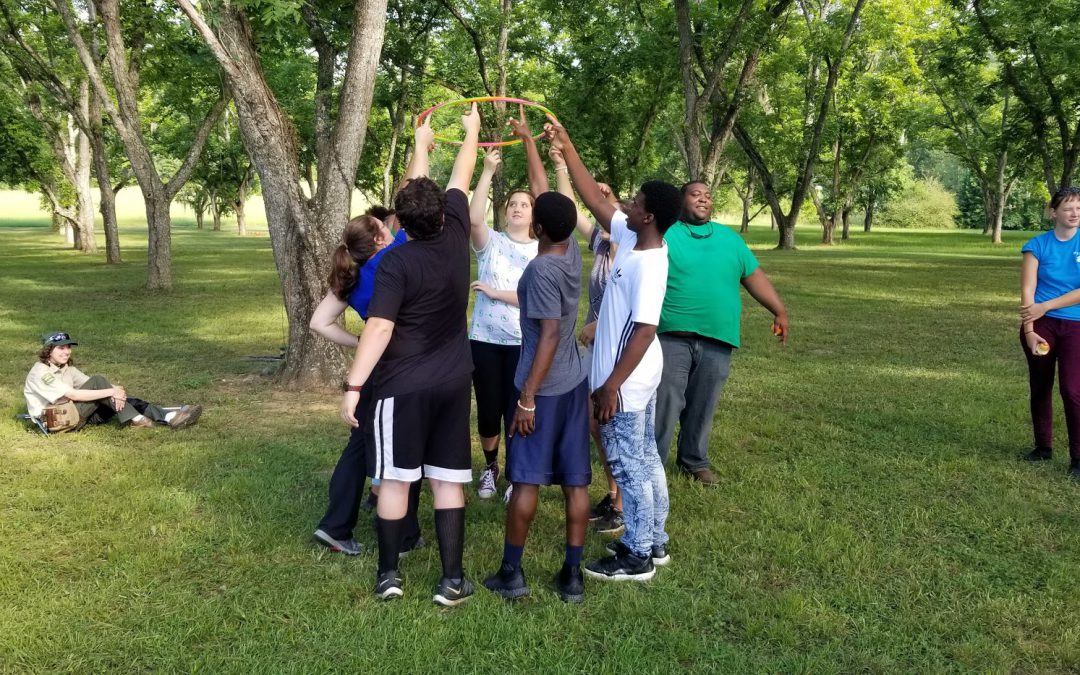
by Marcus Boston Jr. | Aug 2, 2019
Summertime is typically associated with summer vacations, sleeping late, fast foods, rainy days, hot afternoons, and one 4-H camp after the other. Some would argue that summer camps are simply an advanced “day care” program for parents to drop their kids off to “play” so they can be productive at work without worrying about their children. However, research shows that youth who attend camps during the summer come away with so much more than what camping programs are given credit for.
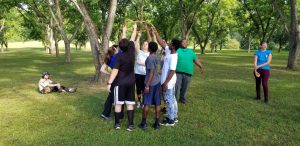
Camp Counselors at Wildlife Camp doing a team building activity.
For many youth, traditional summer camp means no homework, no tests, lots of recreation, camp songs, crafts, and lots of swimming. While these are typical camp activities that normally take place during a week of camp, these experiences have a two-fold purpose in that they also serve as a vehicle for significant learning to take place. Many parents are concerned about the amount of knowledge that kids lose during the summer. There has been substantial research that shows students can lose up to 3 months of what has been learned during the school year. By keeping young people’s brains active, acquiring new skills and knowledge, camp offers the chance to decrease the typical summer learning deficit. How is this done??……I’m glad you asked!
4-H is intentional in providing critical components of a successful learning experience as part of all its summer camp curriculum. These Essential Elements are: Belonging, Independence, Mastery, and Generosity. They are designed to meet the developmental needs of youth. Let me give you some examples.
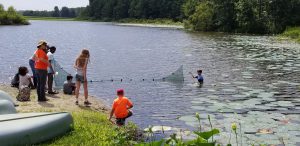
4-H campers seining in Lake Lafayette for aquatic specimens
4-H Camp attendees experience a sense of Belonging, the first Essential Element, during cooling off time at 4-H Camp Cherry Lake, while being cared for by camp staff, counselors, and 4-H Youth Development Professionals. Campers enjoy being in a safe place with their peers without a fear of being bullied. 4-H accepts youth where they are and helps them ignite the spark that exist within them, enabling them to reach their potential.
With no parents on the camp grounds telling their children what to do and when to do it, Independence, the second Essential Element, is a key element that a residential or day camp provides for its attendees. Providing the opportunity for youth to be independent thinkers and to better understand themselves develops at camp as youth learn to make decisions based on experiences and knowledge obtained during camp.
In order to develop the self-confidence needed for youth to feel they can be successful, camp provides many opportunities for Mastery, the third Essential Element, to take place. Whether it is passing the swim test, learning a new skill, or leading a game, having that “I can do this” moment for a camper can make a positive impact on a young person’s life.
Lastly, 4-H camps provide opportunities for youth to learn the importance of Generosity, the fourth Essential Element, by learning and working with campers from diverse backgrounds and different socio-economic levels. Camp could very well be the first time they have spent an increased amount of time with people whose background, race or religion is different from their own. Through planned program curriculum consisting of team building and get acquainted activities throughout the week, the campers learn to focus on what they have in common and to value the contributions of others who may not look or act like them.
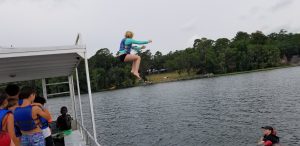
Cooling off time at 4-H Camp Cherry Lake
So being away from home, making new friends, being a part of a team, and trying new things are key building blocks to obtaining a successful experience to meet the developmental needs of youth. 4-H summer camp provides youth the platform to create great memories and lasting relationships that can last a lifetime.
For more information on how your youth can participate in 4-H camps, find your local UF IFAS Extension Office and contact your 4-H Agent to explore what programs are offered in your area.
by Marcus Boston Jr. | Sep 29, 2016
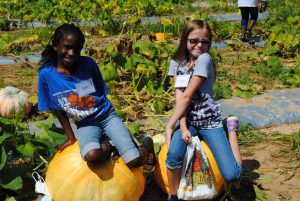
Youth learn about pollination and nutrition at the pumpkin station. The center grows several varieties to demonstrate the diversity of the plant family.
What has 1600 eyes, 1600 legs, can be male or female, and has enough energy collectively to send a rocket to the moon? The 3rd – 5th graders that participate in the multi-county 4-H Ag Adventures Program! This educational adventure is held annually during September at the UF/IFAS North Florida Research and Education Center in Quincy, Florida. This event helps youth understand where their food comes from, the importance of agricultural industry in Florida, and career opportunities in agriculture related fields. Students are introduced to field crops as they rotate through stations that cover peanuts, corn, cotton, pollination, pumpkins, and soils. At each station county extension agents and IFAS research faculty provide “hands on” presentations that are prepared to enhance the students learning experience.
In addition, this event is a platform for youth to learn the current trends, issues and challenges farmers face as they continue to try to feed our increasing population. Some of these trends and challenges include food safety and bio-security, farm labor, bio-security, land use, pest and disease control, and the use of technology in agriculture. This issues encompass all four of the “H’s” in 4-H: Head, Heart, Hands, and Health.
While some youth still associate “agriculture” with increasing negativity (thinking of the hot sun, extreme fatigue, very hard work, minimal income), a recent poll shared on the website Worldbank.org/youthink/ states the top three reasons youth should consider a career in agriculture are the following:
1. Agriculture matters to the future of development,
2. Agriculture can be a gold mine for young entrepreneurs,
3. Agriculture research needs young brain power.
Regional 4-H Agent Heather Kent shares:
“Although this event is geared towards teaching youth about agriculture, the parents and teachers that attend learn just as much and often have more questions that the youth! The adults are just as curious and amazed at how much agriculture affects their daily lives- especially if they do not have an agricultural background. Most of them have no idea how many careers are related to agriculture or how much today’s farmers utilize technology. It’s a real eye-opener for them.”
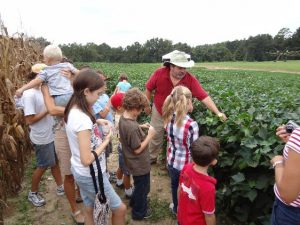
Ag Agent Jed Dillard teaching youth about cotton. Do you know how many pairs of jeans you can make out of a bale of cotton?
This program is sponsored by UF/IFAS, it is also supported by both Florida Farm Bureau and Farm Credit of Northwest Florida. These organizations not only provide funding to help pay for the transportation for students to attend, but they also provide corporate volunteers to help make the event happen. If your child’s classroom missed out on this opportunity, it’s not too late. The North Florida Research and Education Center in Quincy is hosting “Art in the Garden” festival Saturday, October 1st from 9AM -2PM. The event is FREE and open to the public. This event is a great way to learn about agriculture in a fun and family friendly way. There will be trolley tours, demonstrations, games, arts and crafts and food.
In the near future the students that pass through our stations will grow into the adults that will be making important decisions about our food systems. It is in that spirit that we must continue to teach them ….from the ground up. Visit http://faitc.org/kids for more information on careers in agriculture.
If you have a passion or agriculture, consider serving as a 4-H volunteer or advocate to help inspire the next generation. Contact your local UF IFAS County Extension Office or visit http://florida4h.org.
by Marcus Boston Jr. | Nov 26, 2015
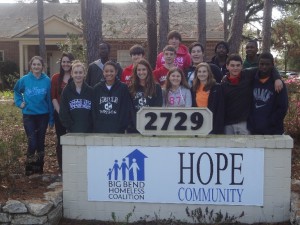
Leon County 4-Hers grow gratitude and compassion through service-learning
Developing a heart for giving back and helping others is one of the most important personal benefits youth can obtain through active involvement in a 4-H program. During this season of thanks , 4-H members all over the United States will put the third sentence of the 4-H pledge into action as they “pledge their hands to larger service” by planning and carrying out a multitude of community service activities to help families that are in need. Since its inception in the early 1900’s the 4-H program has place an emphasis on improving the community in which they live through the guidance and care of adult volunteers.
As we pause this week to celebrate the season of “Thanks” we must also remember to emphasize to our youth that the focus should not be on who can consume the most food, but instead to use the meal as a vehicle to connect with family and friends while enjoying their company. Adults and youth alike should take a pledge during the meal time that no one will post, text, or make a call during family time…but instead exercise some of the great communication skills they have learned in 4-H and get to know each other better. It’s amazing how much our families and friends don’t know about us even though we see them almost every day. Youth should also be encouraged to think of those that are less fortunate and seek out ways they can help those in need as a club, family or as an individual project. A great club or family game can be initiated that requires youth, friends and family members to write a list of all the things they are thankful for and provide fun prizes for the winners… which should be everyone that participates.
As a 4-H Youth Development Professional I am also grateful that the largest serving youth program in the world continues to make a positive impact on the lives of young people. Using the 4-H pledge as a guide I have shared just a few impacts below.
I pledge my head to clearer learning…”I’m thankful that through active participation in a variety of programs and activities youth are learning decision making skills that will help them in school and later in life as they develop into responsible adults”.
I pledge my heart to greater loyalty…” I’m grateful that continual 4-H club involvement provides youth an opportunity to build caring relationships with members of the club as well as the adult volunteer leaders.
I pledge my hands to larger service…I’m thankful that the community service projects that are carried out in each club entitles you to make someone’s life a little brighter.
I pledge my health to better living for my club, my community, my country, and my world….I’m thankful that through their participation and completion of projects youth are learning what to put in their bodies to keep them healthy as well as what not to put in them.
 Let’s continue to use 4-H as a vehicle to make our world better by taking time to invest in your future leaders of tomorrow…..our 4-H members of today. Help 4-H continue to grow by joining as a member or volunteer. Florida 4-H offers a wide variety of programs and volunteer roles to fit your skills, interests, and schedule. Contact your local UF IFAS County Extension Office, or visit http://florida4h.org.
Let’s continue to use 4-H as a vehicle to make our world better by taking time to invest in your future leaders of tomorrow…..our 4-H members of today. Help 4-H continue to grow by joining as a member or volunteer. Florida 4-H offers a wide variety of programs and volunteer roles to fit your skills, interests, and schedule. Contact your local UF IFAS County Extension Office, or visit http://florida4h.org.
by Marcus Boston Jr. | Jun 26, 2015
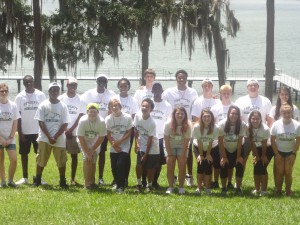 Most of us are familiar with the need for our teens to become more independent, better communicators, and to develop good decision making skills. A quick scan of the news headlines can really make one wonder about the future of our community, country, and world. This post will help relieve your anxieties! One of the ways that the Florida 4-H Program is successfully addressing this need is through our summer camp counselor program. 4-H Camp Counselors have the opportunity to learn valuable leadership skills while at the same time have a positive effect on the lives of many children. Counselors wear many hats during camp, sometimes serving in the role of a parent, role model, confidant, counselor, nurse, and mediator all in one day. The task of sharing the impact teen volunteers make as counselors was not very difficult since this is a role I have personally seen materialize while working as an 4-H extension educator. There is nothing more rewarding then to watch a child grow up starting out as a home sick camper, then developing into a confidence camper, and later becoming a responsible and dependable teen camp counselor.
Most of us are familiar with the need for our teens to become more independent, better communicators, and to develop good decision making skills. A quick scan of the news headlines can really make one wonder about the future of our community, country, and world. This post will help relieve your anxieties! One of the ways that the Florida 4-H Program is successfully addressing this need is through our summer camp counselor program. 4-H Camp Counselors have the opportunity to learn valuable leadership skills while at the same time have a positive effect on the lives of many children. Counselors wear many hats during camp, sometimes serving in the role of a parent, role model, confidant, counselor, nurse, and mediator all in one day. The task of sharing the impact teen volunteers make as counselors was not very difficult since this is a role I have personally seen materialize while working as an 4-H extension educator. There is nothing more rewarding then to watch a child grow up starting out as a home sick camper, then developing into a confidence camper, and later becoming a responsible and dependable teen camp counselor.
A recent study in Wisconsin measuring the impact of being a camp counselor resulted in the following: Teens were asked “What is unique about being a counselor?” and “What skills have you develop as a result of serving as a counselor”? The top eight skills identified included (in order of ranking) leadership, people skills, communication, patience, responsibility, teamwork, problem solving, and planning. They also reported that this experience will help them prepare for their careers because of the skills they have learned (Forsythe, Matysik, and Nelson).
An individual study done on teens that have served as camp counselors in Leon County from 2005 – 2013 showed the top skills the teens gained by serving as a camp counselor were leadership, patience, how to work with kids, and cooperation. Several teens stated that their experience has helped them to decide on what to study in college as well as what career path they would like to pursue. To bring it home and narrow the focus even more our Sr. Counselor application includes the following question: “How have you personally benefited from being a counselor?” All seven responses from our senior counselors can be summarized by the following statements:
“I’m more responsible and have made life long friendships”
“I have learned leadership skills and how to handle stressful situations”
“I’ve learned how to make campers have fun”
“It’s taught me how to communicate better and made me more outgoing”
“I was hired at my current job because I told my employee I was a camp counselor”
Research has clearly shown that the camp counselor experience provides an excellent opportunity for teens to gain leadership skills that are proven to build much needed life skills that will help them later in life. To find out more about 4-H teen leadership programs, contact your local UF IFAS Extension Office. If you have skills or experiences to share with teens to help prepare them for a future career, consider becoming a 4-H Volunteer. We offer a variety of volunteer roles based on your interests and schedule.
We hope you have enjoyed this month’s series on 4-H Summer Camp. Next week, a new series on summer safety will begin as Yolanda Goode shares firework safety tips! Your opinion matters to us- please take this short survey to provide feedback to help us improve this blog https://ufl.qualtrics.com/SE/?SID=SV_3gtLKjqia3F75QN.
by Marcus Boston Jr. | Mar 10, 2014
Embryology is defined as science that deals with the study and development of an embryo. In this project, participants will learn how life develops by observing chicken eggs that you will set in your incubator. The 4-H club leader(s) as well as the youth will be responsible for the daily care of the incubator and eggs throughout the process.
Children have a natural sense of curiosity about living things in the world around them. Building on this curiosity, students can develop an understanding of biology concepts through direct experience with living things, their life cycles and their habitats. 4-H has always promoted “hands on” activities through its many project areas, most specifically embryology. This project allows its participants to learn by listening, observing, experimenting and applying their knowledge to real-world situations.
How Do You Get Started? If I attempted to list all the steps involved in the 4-H Embryology Project I would eventually run out of room in this posting. The recommended step to take in getting this project off the ground is to contact and partner with your 4-H extension agent. They may be able to help you get started by securing an incubator, identifying a reliable source for fertile eggs, and provide additional resources in the form of “project and/or record books” for the youth participating in the project. The agent will also be able assist with planning your calendar, establishing a location for the hatched chicks and to troubleshoot just in case problems arise throughout the project. There are many different types of incubators that can be used to hatch eggs but working with your 4-H professional to make sure you have the right one for your project is essential to having a successful hatch.
What If I’ve Done This Project Before? If you are already familiar with how to set up your embryology project it is still recommended to inform your 4-H extension agent so they can keep an accurate record of the number of youth engaged in the embryology project while at the same time provide the support and additional assistance that may be needed.
So What’s Next? Decide along with your club members where the incubator will be kept, follow your 4-H Embryology Project Book Curriculum and watch in amazement as the youth in your club develop their curiosity, increase the communication with each other, and deepen their understanding of science, engineering and technology while taking a journey through an unforgettable experience.
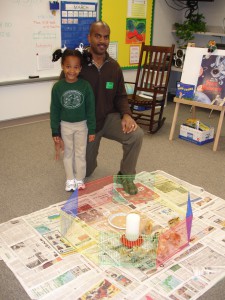
4-H Agent Marcus Boston completing 4-H Embryology with kindergarten class










